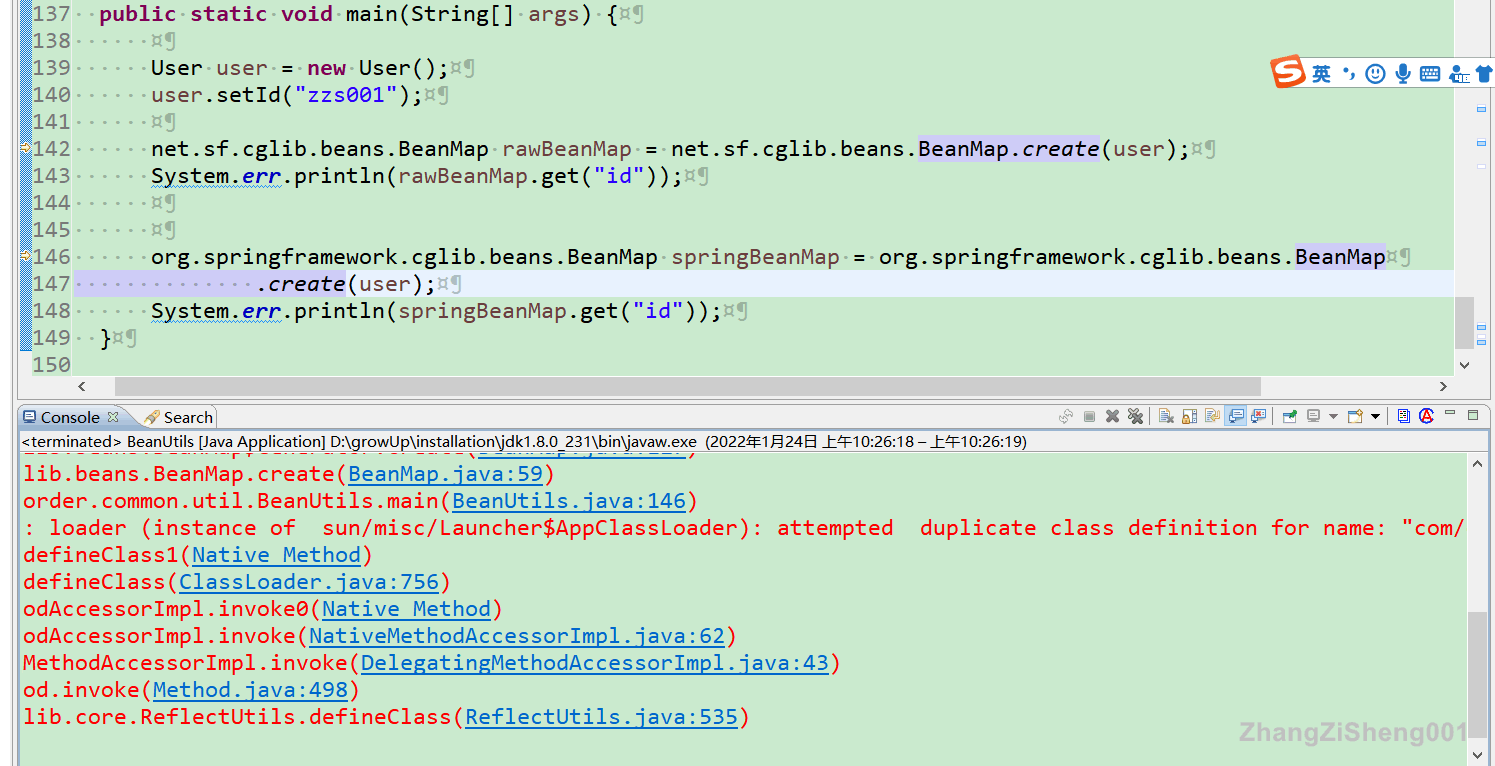2022-01-21 早上 9 点,订单系统出现大面积的“系统未知错误”报错,导致部分用户无法正常下单。查询后台日志,可以看到大量的 duplicate class attempt。
java.lang.LinkageError-->loader (instance of org/springframework/boot/loader/LaunchedURLClassLoader): attempted duplicate class definition for name: "com/order/vo/OrderAndExtendVO$$BeanMapByCGLIB$$e8178b2a"
StackTrace:
org.springframework.cglib.core.CodeGenerationException: java.lang.LinkageError-->loader (instance of org/springframework/boot/loader/LaunchedURLClassLoader): attempted duplicate class definition for name: "com/order/vo/OrderAndExtendVO$$BeanMapByCGLIB$$e8178b2a"
at org.springframework.cglib.core.ReflectUtils.defineClass(ReflectUtils.java:538)
at org.springframework.cglib.core.AbstractClassGenerator.generate(AbstractClassGenerator.java:363)
at org.springframework.cglib.core.AbstractClassGenerator$ClassLoaderData$3.apply(AbstractClassGenerator.java:110)
at org.springframework.cglib.core.AbstractClassGenerator$ClassLoaderData$3.apply(AbstractClassGenerator.java:108)
at org.springframework.cglib.core.internal.LoadingCache$2.call(LoadingCache.java:54)
at java.util.concurrent.FutureTask.run(FutureTask.java:266)
at org.springframework.cglib.core.internal.LoadingCache.createEntry(LoadingCache.java:61)
at org.springframework.cglib.core.internal.LoadingCache.get(LoadingCache.java:34)
at org.springframework.cglib.core.AbstractClassGenerator$ClassLoaderData.get(AbstractClassGenerator.java:134)
at org.springframework.cglib.core.AbstractClassGenerator.create(AbstractClassGenerator.java:319)
at org.springframework.cglib.beans.BeanMap$Generator.create(BeanMap.java:127)
at org.springframework.cglib.beans.BeanMap.create(BeanMap.java:59)
····省略其他堆栈
首先,通过堆栈,可以初步判断,报错是 cglib 尝试生成一个已经存在的 class 导致的。
代码中调用了BeanMap.create(Object)方法,这个方法会生成动态代理类。我们直接进入到AbstractClassGenerator.create(Object)的源码,可以看到,全局缓存里已经有了就不会再次生成,按理来说,代理类并不会重复生成,难道缓存失效了吗?
一开始我怀疑是因为缓存被禁用了。但是吧,这个 useCache 字段只能通过AbstractClassGenerator.setUseCache(boolean)方法设置,而整个项目并没有任何地方引用到这个方法,所以,这个假设并不成立。
abstract public class AbstractClassGenerator<T> implements ClassGenerator {
// 是否使用缓存
private boolean useCache = true;
private static final Object NAME_KEY = new Object();
// 缓存是全局的
private static final Source SOURCE = new Source(BeanMap.class.getName());
protected static class Source {
String name;
/*
* 全局缓存,格式为:
* <blockquote><pre>
* {
* "classLoader1":{
* NAME_KEY:["className1","className2"],
* "className1":class1,
* "className2":class2
* },
* "classLoader2":{
* NAME_KEY:["className2","className3"],
* "className3":class3,
* "className2":class2
* }
* }
* zzs001
* </pre></blockquote>
*/
Map cache = new WeakHashMap();
public Source(String name) {
this.name = name;
}
}
protected Object create(Object key) {
try {
Class gen = null;
synchronized (source) {
ClassLoader loader = getClassLoader();
Map cache2 = null;
cache2 = (Map)source.cache.get(loader);
if (cache2 == null) {
cache2 = new HashMap();
cache2.put(NAME_KEY, new HashSet());
source.cache.put(loader, cache2);
} else if (useCache) {
Reference ref = (Reference)cache2.get(key);
gen = (Class) (( ref == null ) ? null : ref.get());
}
if (gen == null) {
Object save = CURRENT.get();
CURRENT.set(this);
try {
this.key = key;
if (attemptLoad) {
try {
gen = loader.loadClass(getClassName());
} catch (ClassNotFoundException e) {
// ignore
}
}
if (gen == null) {
byte[] b = strategy.generate(this);
String className = ClassNameReader.getClassName(new ClassReader(b));
getClassNameCache(loader).add(className);
gen = ReflectUtils.defineClass(className, b, loader);
}
if (useCache) {
cache2.put(key, new WeakReference(gen));
}
return firstInstance(gen);
} finally {
CURRENT.set(save);
}
}
}
return firstInstance(gen);
} catch (RuntimeException e) {
throw e;
} catch (Error e) {
throw e;
} catch (Exception e) {
throw new CodeGenerationException(e);
}
}
}我突然想到,这个 cglib 只是 spring 内嵌的 cglib,并不是”真正的 cglib“。缓存只是在当前的这个 cglib 生效,如果原生的 cglib 也要创建这个类,是不是就会报错了呢?
通过查看引用,项目里确实存在这种情况:使用了不同的 cglib 来创建同一个类:
接着我用代码试验了一下,果然出现了同样的报错:
于是,我们可以给出结论:使用了spring 和原生两个不同的 cglib 来生成同一个 class,会因为缓存无法共享而出现 duplicate class attempt 的报错。
知道了原因,解决的办法就非常简单了。只要把 cglib 的导包改成同一个就行了。
修复后,生产再无该类报错,基本证明我们是对的。
以上就是这次生产报错的处理过程。这里我有几个疑惑的地方:
- cglib 判断一个 class 是否存在,为什么不直接检查项目里的 class?却要用缓存这种不可靠的手段?
- spring 为什么不直接依赖 cglib?而要自己内嵌一个?
最后,感谢阅读,欢迎交流、指正。
本文为原创文章,转载请附上原文出处链接:https://www.cnblogs.com/ZhangZiSheng001/p/15838657.html

